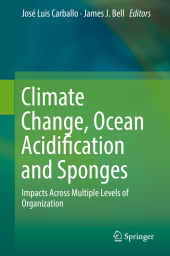 Neuerscheinungen 2017Stand: 2020-02-01 |
Schnellsuche
ISBN/Stichwort/Autor
|
Herderstra▀e 10
10625 Berlin
Tel.: 030 315 714 16
Fax 030 315 714 14
info@buchspektrum.de |

James J. Bell, JosÚ Luis Carballo
(Beteiligte)
Climate Change, Ocean Acidification and Sponges
Impacts Across Multiple Levels of Organization
Herausgegeben von Carballo, JosÚ Luis; Bell, James J.
1st ed. 2017. 2017. viii, 452 S. 17 SW-Abb., 25 Farbabb., 23 Farbtabellen. 235 mm
Verlag/Jahr: SPRINGER, BERLIN; SPRINGER INTERNATIONAL PUBLISHING 2017
ISBN: 3-319-59007-3 (3319590073)
Neue ISBN: 978-3-319-59007-3 (9783319590073)
Preis und Lieferzeit: Bitte klicken
While sponges represent a very simple group of organisms, which are represented by over 8000 species, there is considerable interest in the increasing role they may play in future marine ecosystems. While we still have a comparatively limited understanding of how sponges will respond to ocean warming and acidification there is evidence that some species may have the ability to acclimate or even adapt to these stressors. This comprehensive collection of articles describes our current understanding of the impacts of ocean acidification and warming on sponges across multiple levels of biological organisation, and from the geological past to the present. With expert contributions from across the world this book represents the most up-to-date view on sponge responses to climate change. This book will be of interest to a wide audience of marine scientists and managers, who are grappling with how to manage, conserve and protect marine ecosystems.
Chapter 1. Climate change, ocean acidification and sponges: an introduction.- Chapter 2. Lessons from the past: sponges in the geological record.- Chapter 3. Sponges as proxies for past climate change events.- Chapter 4. Gene expression and epigenetics and acclamatory mechanism in sponges.- Chapter 5. Molecular and functional ecology of sponge and their microbial symbionts.- Chapter 6. Temporal impacts of large-scale climatic variation on sponge assemblages.- Chapter 7. Excavating sponges and the future of coral reefs.- Chapter 8. Budgets, nutrient fluxes and ecological functions of coral reefs sponges in a warming planet.- Chapter 9. Analysing the relationship between climate change and sponges disease outbreaks.- Chapter 10. The deep glass sponge reefs.- Chapter 11. Future research directions, and gaps in our understanding of climate change and ocean acidification impacts on sponges.
Dr. Jose Luis Carballo is a Senior Researcher and Professor of the postgraduate program in Marine Ecology at the Institute of Marine Science and Limnology at Universidad Nacional Autonˇma de Mexico. (UNAM). He received his doctorate in Zoology in 1994 (Sevilla University) obtaining Cum Laude with the Thesis Sponges from the Strait of Gibraltar and after that obtained a postdoctoral Research Fellow on Research and Development. Currently is Senior Researcher in the UNAM, where he has published more than 100 scientific research papers, books, invited major review chapters which have been cited more than 1,800 times (Google Scholar). He has also successfully supervised to completion more than 40 postgraduate (MS and PhD thesis) and Postdoctoral research fellows who research focused mainly in the study of taxonomy, biology an ecology of marine sponges. His current research interests focus mainly in coral reef sponges, and especially in boring sponges, on topics ranging from taxonomy, distribution, reproduction and dispersion. He is also interested in the general broad-scale variability in bioeroder communities and rates of erosion in Mexican Pacific coral reefs, and to understand how climate change and ocean acidification will influence bioerosion distribution and abundance of boring sponges.


